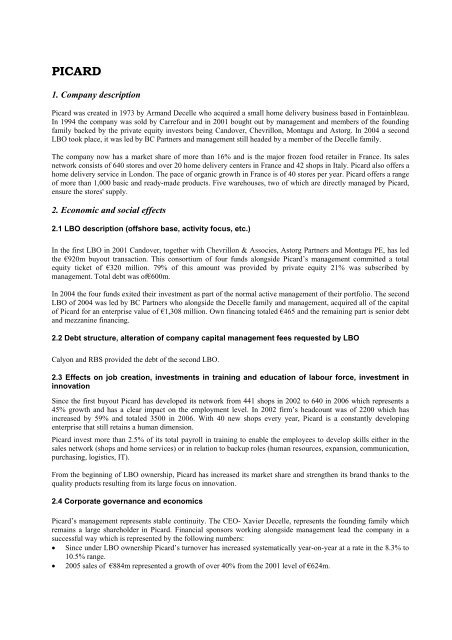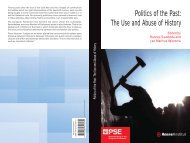Executive summary - Udo Bullmann
Executive summary - Udo Bullmann
Executive summary - Udo Bullmann
- No tags were found...
Create successful ePaper yourself
Turn your PDF publications into a flip-book with our unique Google optimized e-Paper software.
PICARD1. Company descriptionPicard was created in 1973 by Armand Decelle who acquired a small home delivery business based in Fontainbleau.In 1994 the company was sold by Carrefour and in 2001 bought out by management and members of the foundingfamily backed by the private equity investors being Candover, Chevrillon, Montagu and Astorg. In 2004 a secondLBO took place, it was led by BC Partners and management still headed by a member of the Decelle family.The company now has a market share of more than 16% and is the major frozen food retailer in France. Its salesnetwork consists of 640 stores and over 20 home delivery centers in France and 42 shops in Italy. Picard also offers ahome delivery service in London. The pace of organic growth in France is of 40 stores per year. Picard offers a rangeof more than 1,000 basic and ready-made products. Five warehouses, two of which are directly managed by Picard,ensure the stores' supply.2. Economic and social effects2.1 LBO description (offshore base, activity focus, etc.)In the first LBO in 2001 Candover, together with Chevrillon & Associes, Astorg Partners and Montagu PE, has ledthe €920m buyout transaction. This consortium of four funds alongside Picard’s management committed a totalequity ticket of €320 million. 79% of this amount was provided by private equity 21% was subscribed bymanagement. Total debt was of€600m.In 2004 the four funds exited their investment as part of the normal active management of their portfolio. The secondLBO of 2004 was led by BC Partners who alongside the Decelle family and management, acquired all of the capitalof Picard for an enterprise value of €1,308 million. Own financing totaled €465 and the remaining part is senior debtand mezzanine financing.2.2 Debt structure, alteration of company capital management fees requested by LBOCalyon and RBS provided the debt of the second LBO.2.3 Effects on job creation, investments in training and education of labour force, investment ininnovationSince the first buyout Picard has developed its network from 441 shops in 2002 to 640 in 2006 which represents a45% growth and has a clear impact on the employment level. In 2002 firm’s headcount was of 2200 which hasincreased by 59% and totaled 3500 in 2006. With 40 new shops every year, Picard is a constantly developingenterprise that still retains a human dimension.Picard invest more than 2.5% of its total payroll in training to enable the employees to develop skills either in thesales network (shops and home services) or in relation to backup roles (human resources, expansion, communication,purchasing, logistics, IT).From the beginning of LBO ownership, Picard has increased its market share and strengthen its brand thanks to thequality products resulting from its large focus on innovation.2.4 Corporate governance and economicsPicard’s management represents stable continuity. The CEO- Xavier Decelle, represents the founding family whichremains a large shareholder in Picard. Financial sponsors working alongside management lead the company in asuccessful way which is represented by the following numbers:• Since under LBO ownership Picard’s turnover has increased systematically year-on-year at a rate in the 8.3% to10.5% range.• 2005 sales of €884m represented a growth of over 40% from the 2001 level of €624m.





